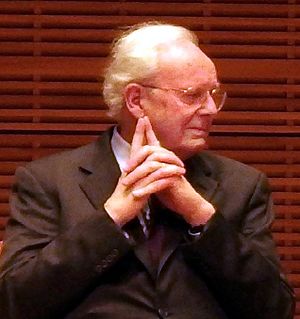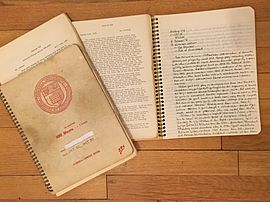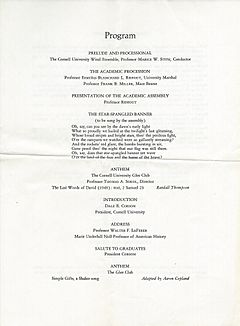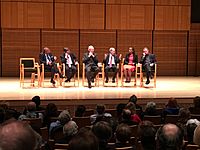Walter LaFeber facts for kids
Quick facts for kids
Walter LaFeber
|
|
|---|---|

LaFeber in 2016
|
|
| Born | August 30, 1933 Walkerton, Indiana, U.S.
|
| Died | March 9, 2021 (aged 87) Ithaca, New York, U.S.
|
| Nationality | American |
| Education | B.A. Hanover College, 1955 M.A. Stanford University, 1956 PhD History, University of Wisconsin, 1959 |
| Occupation | Professor of History |
| Era | 1950s–2000s |
|
Notable work
|
The New Empire: An Interpretation of American Expansion, 1860–1898 America, Russia and the Cold War, 1945–2006 The Panama Canal: The Crisis in Historical Perspective The Clash: U.S.-Japanese Relations Throughout History |
| Spouse(s) | Sandra Gould |
| Children | 2 |
| Awards |
|
| Scientific career | |
| Institutions | Cornell University |
| Thesis | The Latin American Policy of the Second Cleveland Administration (1959) |
| Doctoral advisor | Fred Harvey Harrington |
| Notable students |
|
Walter Fredrick LaFeber (August 30, 1933 – March 9, 2021) was a famous American history professor. He taught at Cornell University for many years.
LaFeber was known as one of the best experts on the history of U.S. foreign policy. He was part of the "Wisconsin School" of history. He wrote books that looked at the Cold War in new ways.
His class, "History of American Foreign Relations," was very popular at Cornell. Many of his students went on to work in the U.S. government or become professors themselves. In 2006, he gave a special farewell lecture to almost 3,000 people.
Contents
Early Life and School Years
Walter LaFeber was born in Walkerton, Indiana, on August 30, 1933. His father owned a grocery store, and his mother was a housewife. Walter worked in his father's store from age eight through college. He was a big fan of the Chicago Cubs baseball team.
At Walkerton High School, LaFeber was a tall and talented basketball player. He once scored 35 points in a game! He finished high school in 1951.
He then went to Hanover College, a small college in Indiana. He played basketball there for two years. He also sang in the college choir and was involved in student activities. He earned his bachelor's degree in 1955.
Walter met Sandra Gould at Hanover College. They got married in 1955 and had two children.
He continued his studies at Stanford University, earning his master's degree in 1956. He then went to the University of Wisconsin for his PhD. At Wisconsin, he was taught by William Appleman Williams, who greatly influenced his ideas about history. LaFeber earned his PhD in 1959. His main research was about American policy in Latin America.
Walter LaFeber's Books and Ideas
Cornell University hired LaFeber as a professor in 1959. He became a full professor in 1967.
The New Empire and Early Works
LaFeber's first major book, The New Empire: An Interpretation of American Expansion, 1860–1898, came out in 1963. It was a bigger version of his PhD paper. This book won an award and made him a well-known historian. It is still used in colleges today.
His next book, America, Russia and the Cold War, 1945-1966, was published in 1967. This book was very popular and was updated many times. The last version, America, Russia, and the Cold War, 1945-2006, came out in 2006. It helped people understand the history of the Cold War.
Later Books and Key Themes
LaFeber's 1978 book, The Panama Canal: The Crisis in Historical Perspective, was important. It helped shape public opinion about the Panama Canal and influenced the U.S. Senate's decision to approve the Panama Canal Treaty.
His book Inevitable Revolutions: The United States in Central America (1984) won an award. In it, he explored how corporate interests and U.S. government policies affected countries in Central America.
In The Clash: U.S.-Japanese Relations Throughout History (1997), LaFeber looked at the long history between the U.S. and Japan. This book won two major awards: the Bancroft Prize and the Ellis W. Hawley Prize.
He even wrote a book about basketball! Michael Jordan and the New Global Capitalism (1999) looked at how sports, like basketball, and famous athletes, like Michael Jordan, became part of globalization.
Overall, LaFeber's work focused on how economic reasons and markets influenced U.S. foreign policy. He also looked at how revolutions in other countries and the decisions of important individuals shaped American actions.
Teaching at Cornell University
LaFeber was a beloved teacher. He won the Clark Distinguished Teaching Award at Cornell in 1966.
His class, "History of American Foreign Relations," was one of the most popular and challenging courses at Cornell. Many students took it, especially during the Vietnam War, when they wanted to understand why the U.S. was involved in conflicts abroad. His lectures were famous.
LaFeber was known for his simple, clear teaching style. He would write a short outline on the chalkboard and then speak without notes, relying on his memory. He spoke softly, which made students listen very carefully. He wanted students to learn how to think critically about history, not just agree with his views. His classes often ended with loud applause.
In 2013, the American Historical Association said that LaFeber was a "legendary" teacher. They noted that his classes often had over 300 students, and he still ran discussion groups and graded papers himself.
In May 1976, LaFeber became the first professor ever to give the graduation speech at Cornell University. The university president chose him because he could speak with great knowledge about the nation's history during the United States Bicentennial.
LaFeber later taught part-time, focusing more on research and writing. But he returned to full-time teaching when he was offered the Andrew H. and James S. Tisch Distinguished University Professor position, which is Cornell's highest honor for a professor.
After the September 11 attacks, Cornell's president asked LaFeber to give a speech to remember the event. This shows how much he was respected.
Many of his former students, no matter what they did later in life, remembered his lectures with great respect. Some said his class changed their lives.
Many of LaFeber's students became important figures in government and other fields, including:
- Thomas Downey, a U.S. Representative
- Stephen Hadley, a U.S. National Security Advisor
- Eric S. Edelman, an Undersecretary of Defense and U.S. Ambassador
- Andrew Tisch, a businessman
- Sandy Berger, a U.S. National Security Advisor
- Derek Chollet, an Assistant Secretary of Defense
LaFeber's students worked for different political parties and had various viewpoints. He always said he didn't want "disciples" who just agreed with him. He believed the most important thing was to study history and think for yourself.
Academic Life and Awards
In the 1960s, LaFeber spoke out against the U.S. involvement in the Vietnam War. He believed that professors should use their academic freedom to criticize society when it goes in the wrong direction.
He was a member of the Department of State Historical Advisory Committee from 1971 to 1975. This committee helped choose and produce important historical documents for the U.S. government.
LaFeber received a Guggenheim Fellow award in 1989. He gave lectures at many universities and appeared on radio and television. He was also elected to the American Academy of Arts and Sciences. In 1999, he served as president of the Society for Historians of American Foreign Relations.
In 2004, a special issue of the journal Diplomatic History honored his career. The journal's editor said LaFeber had been a "commanding presence" in the field of American foreign relations history for over 40 years.
Later Years and Legacy
Walter LaFeber retired in 2006 after 46 years at Cornell. His farewell lecture on April 25, 2006, was held at the Beacon Theatre in New York City. Almost 3,000 former students, alumni, and colleagues came to hear him speak. The lecture was about the origins of American foreign policy, and he gave it without notes, just like his classes. It ended with a standing ovation.
In 2013, the American Historical Association gave LaFeber a lifetime achievement award. They praised him for changing how American foreign relations were studied and for being a valuable public intellectual who could reach many people without losing academic quality.
In 2016, LaFeber and some of his famous students discussed Cornell's influence on American diplomacy at Zankel Hall in New York City.
Walter LaFeber passed away on March 9, 2021, at the age of 87.
Soon after, Cornell University created the Walter F. LaFeber Professor position. This was made possible by a gift from Andrew H. Tisch, one of his former students.
Works
- Books
- The New Empire: An Interpretation of American Expansion, 1860–1898 (1963)
- America, Russia and the Cold War, 1945–2006 (1967, last edition 2006)
- The Panama Canal: The Crisis in Historical Perspective (1978)
- Inevitable Revolutions: The United States in Central America (1983)
- The American Age: United States Foreign Policy at Home and Abroad since 1750 (1989)
- The Clash: U.S.-Japanese Relations Throughout History (1997)
- Michael Jordan and the New Global Capitalism (1999)




